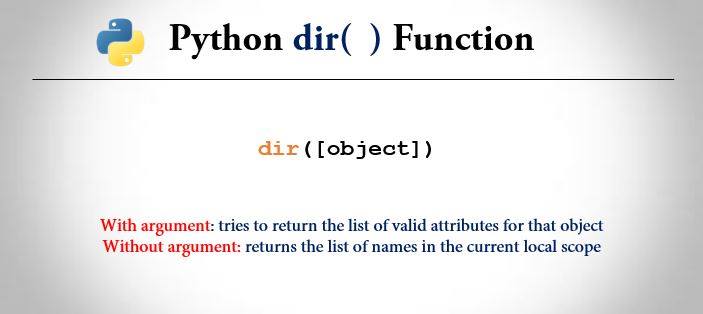The Python dir() function, with arguments, tries to return the list of valid attributes for that object and without an argument dir() returns the list of names in the current local scope.

Python dir() Syntax
dir([object])
Python dir() takes only one parameter as an argument.
- object: It is optional and is the name of the object whose attributes are to be displayed.
In simple language, dir() function returns the list of all functions or methods associated with the object supplied.
Return value of Python dir()
- If the object has a method named
__dir__(), this method will be called and must return the list of attributes. This allows objects that implement a custom__getattr__()or__getattribute__()function to customize the way dir() reports their attributes. - If the object does not provide
__dir__(), the function tries its best to gather information from the object’s__dict__attribute, if defined, and from its type object. The resulting list is not necessarily complete and may be inaccurate when the object has a custom__getattr__().
Depending on the type of object supplied as the argument, here is what Python dir() returns as a list.
- If the object is a module object, the list contains the names of the module’s attributes.
- If the object is a type or class object, the list contains the names of its attributes, and recursively of the attributes of its bases.
- Otherwise, the list contains the object’s attributes’ names, the names of its class’s attributes, and recursively of the attributes of its class’s base classes.
How Python dir() works?
class Example:
def __init__(self,a):
delf.a = a
dir(Example)As we already mentioned, since dir() function takes a class object as an argument, it will return a list of the classes attributes and their bases.
['__class__', '__delattr__', '__dict__', '__dir__', '__doc__', '__eq__', '__format__', '__ge__', '__getattribute__', '__gt__', '__hash__', '__init__','__init_subclass__', '__le__', '__lt__', '__module__', '__ne__', '__new__', '__reduce__', '__reduce_ex__', '__repr__', '__setattr__', '__sizeof__', '__str__', '__subclasshook__', '__weakref__']
Python dir() Function Example
If we supply a string as an object to dir() function, it will return all the methods and functions associated with the string and same goes with every object.
>>> #dir() with string
>>> dir(str)
['__add__', '__class__', '__contains__', '__delattr__', '__dir__', '__doc__', '__eq__', '__format__', '__ge__', '__getattribute__', '__getitem__', '__getnewargs__', '__gt__', '__hash__', '__init__', '__init_subclass__', '__iter__', '__le__', '__len__', '__lt__', '__mod__', '__mul__', '__ne__', '__new__', '__reduce__', '__reduce_ex__', '__repr__', '__rmod__', '__rmul__', '__setattr__', '__sizeof__', '__str__', '__subclasshook__', 'capitalize', 'casefold', 'center', 'count', 'encode', 'endswith', 'expandtabs', 'find', 'format', 'format_map', 'index', 'isalnum', 'isalpha', 'isdecimal', 'isdigit', 'isidentifier', 'islower', 'isnumeric', 'isprintable', 'isspace', 'istitle', 'isupper', 'join', 'ljust', 'lower', 'lstrip', 'maketrans', 'partition', 'replace', 'rfind', 'rindex', 'rjust', 'rpartition', 'rsplit', 'rstrip', 'split', 'splitlines', 'startswith', 'strip', 'swapcase', 'title', 'translate', 'upper', 'zfill']
>>> #dir() with a number
>>> a = 2
>>> dir(a)
['__abs__', '__add__', '__and__', '__bool__', '__ceil__', '__class__', '__delattr__', '__dir__', '__divmod__', '__doc__', '__eq__', '__float__', '__floor__', '__floordiv__', '__format__', '__ge__', '__getattribute__', '__getnewargs__', '__gt__', '__hash__', '__index__', '__init__', '__init_subclass__', '__int__', '__invert__', '__le__', '__lshift__', '__lt__', '__mod__', '__mul__', '__ne__', '__neg__', '__new__', '__or__', '__pos__', '__pow__', '__radd__', '__rand__', '__rdivmod__', '__reduce__', '__reduce_ex__', '__repr__', '__rfloordiv__', '__rlshift__', '__rmod__', '__rmul__', '__ror__', '__round__', '__rpow__', '__rrshift__', '__rshift__', '__rsub__', '__rtruediv__', '__rxor__', '__setattr__', '__sizeof__', '__str__', '__sub__', '__subclasshook__', '__truediv__', '__trunc__', '__xor__', 'bit_length', 'conjugate', 'denominator', 'from_bytes', 'imag', 'numerator', 'real', 'to_bytes']
As you can see in above example, Python dir() function returns all the attributes related to the object supplied as an argument.
